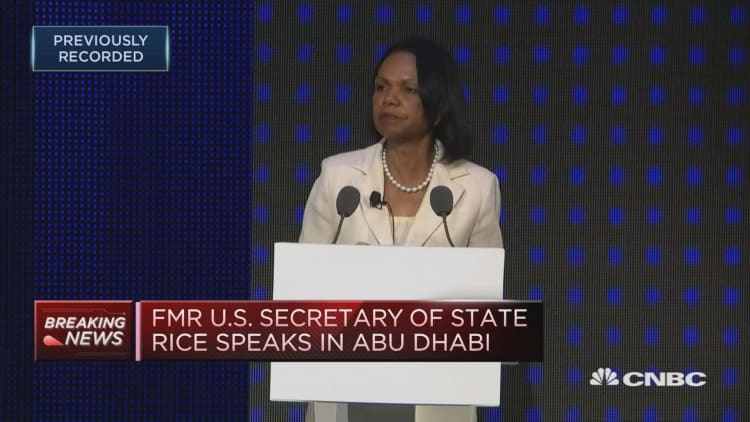Holly Ellyatt
 Condoleezza Rice, the former United States Secretary of State, said on Monday the ‘global order’ was in a “somewhat dangerous and chaotic” state.
Condoleezza Rice, the former United States Secretary of State, said on Monday the ‘global order’ was in a “somewhat dangerous and chaotic” state.
The global or world order refers to a rule-based system of international relations created by the U.S. and its allies after World War Two.
Headlining a CNBC-moderated panel on “Political Risk in the 21st Century” at the Adipec oil and gas conference in Abu Dhabi, Rice told the audience that “the global order is suffering a period of dislocation.”
Condoleezza Rice, the former United States Secretary of State, said on Monday the ‘global order’, or rule-based system of international relations created by the U.S. and its allies after World War Two, was in a “somewhat dangerous and chaotic” state.
Headlining a CNBC-moderated panel on “Political Risk in the 21st Century” at the Adipec oil and gas conference in Abu Dhabi, Rice told the audience that “the global order is suffering a period of dislocation, I think we all feel that the international system is somewhat dangerous and chaotic.”
“It’s not because there are discreet crises but because instead, we’re seeing the breakdown of the global order as we once knew it,” Rice told the audience in Abu Dhabi.
The global order was created after the second World War by the U.S. and its allies with one of its central tenets being free and open trade, which was now under threat, she said.

“The international economy was created as one that was intended to be a positive sum game, as in ‘my growth would not come at your expense’ … They created a different kind of system, one that was based on free and open trade and one in which there were great institutions like the International Monetary Fund (IMF) and World Bank ... that system also relied on U.S. leadership and U.S. military protection,” she said.
“I would suggest to you that now, now that system is under strain and under threat.”
Rice’s comments against a sea change in U.S. politics both domestically and internationally since the presidency of Donald Trump began in 2016. Trump’s presidential style and approach to global affairs and foreign policy has upended traditional norms and relationships on a geopolitical and economic front. Most notably, Trump’s decision to impose import tariffs on various trading partners and an ensuing trade war with China.
The U.S. and China are currently discussing a deal to end an escalation of tensions and tariffs seen to have impacted both countries’ growth negatively.
Trump has advocated an “America First” approach to global affairs; his critics say he is guilty of fermenting populist and protectionist sentiment in the U.S. that could actually damage the country’s interests rather than protect them.
Rice said the global system or global order, in place since 1945, was under threat from three challenges, the first being maintaining international security and preventing terrorist attacks as well as dealing with the cyber security threat.
“A second big challenge to the system, the global order that was created after 1945, is the problem of great power rivalry which has emerged strongly in the last several years,” she said, referencing U.S. relations with Russia (whose interference in the 2016 U.S. election is still “a major issue of division in the U.S.,” Rice said) as well as with a “rising China.”
“If Russia is a power that is somewhat diminished from where it was, China is a rising power. And how to deal with a relationship with China that is actually very complex, not at all simple, is one of the real challenges for the United States today,” she said.
However, Rice said that “nothing challenges this system like the rise of populism, nationalism, protectionism and isolationism,” she said.
“Populations are being told that the elites and institutions that represent them are not really in their interest, they’re being told that globalization has not served them well, and frankly, for some people globalization has not worked,” she said.
However, it was the international economic system in place since 1945 that “has sustained international economic growth,” she said.
If that system is to survive the challenges of great power rivalry, security threats and nationalism and populism, Rice said governments needed to meet citizens’ expectations when it comes to education, and employ technology in a better way.
Asked by CNBC’s Hadley Gamble how the U.S. should address being left out of joint economic projects, such as the recently renamed Russian-Chinese-Saudi investment fund, Rice said the U.S. needed to promote its own investment credentials.
“The U.S. needs to address that by being here, you can’t leave the playing field and expect that somebody else won’t come in. We need to be here, we need to make very clear that investment in the U.S. is both welcome and safer because after all we do have rule of law.”
“The rule of law, the respect for contracts, the respect for intellectual property, we have so many reasons for people to continue to want to make the US the investment destination.”
No comments:
Post a Comment